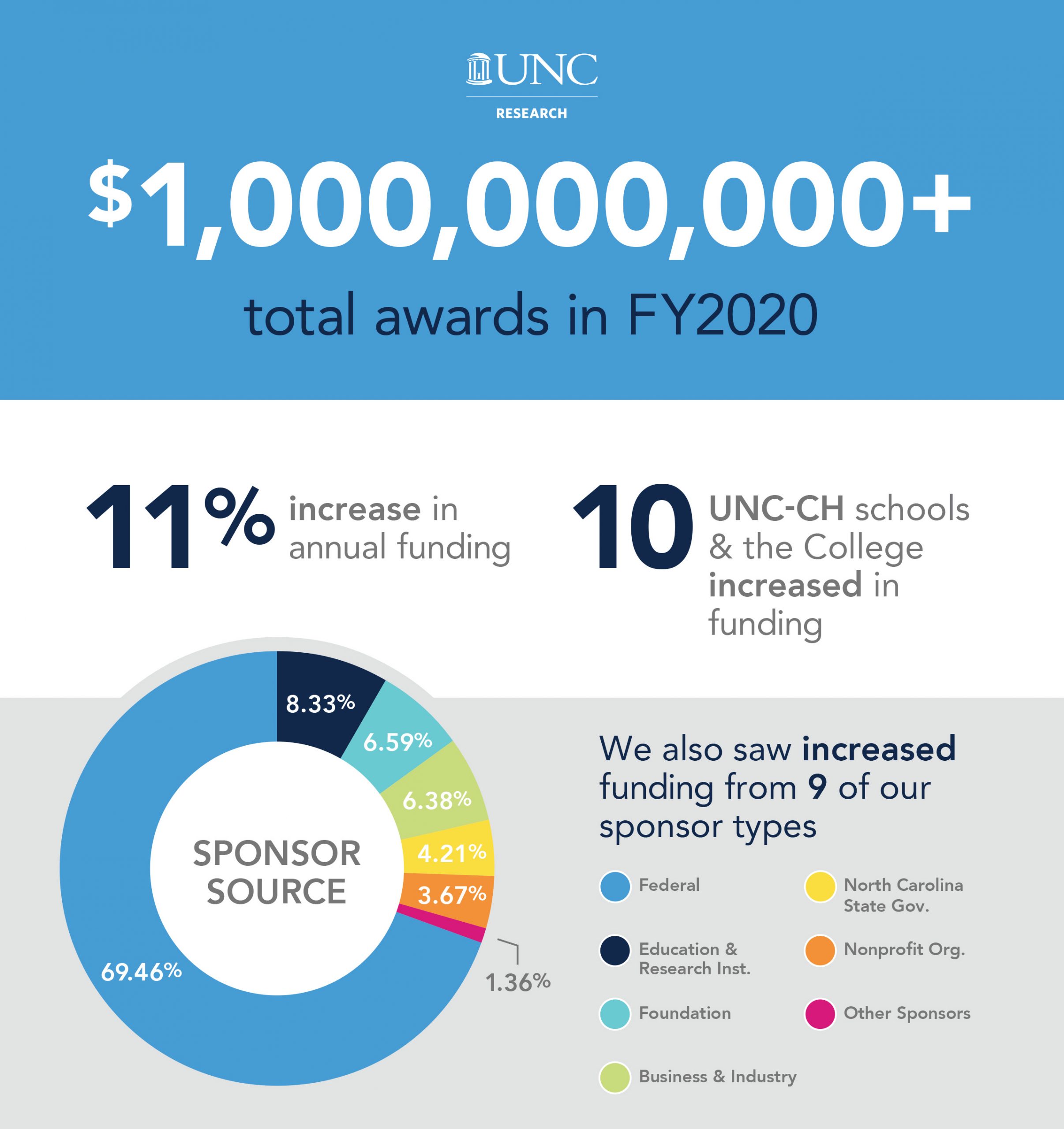UNC-Chapel Hill sets a record year for research as new grant awards top $1 billion
For the first time in the University’s history, annual new awards for research conducted at the University of North Carolina at Chapel Hill have exceeded the $1 billion mark. The record amount in new grants, contracts and awards received in the fiscal year that concluded June 30 comes largely from sources outside of North Carolina primarily from federal research agencies, industry and nonprofit organizations.
Overall, the University received more than $1.048 billion in new research awards in FY20. Funding from these awards is used by faculty experts, staff and students to conduct research projects and experiments for external sponsors. Research at Carolina drives discoveries, innovation and breakthroughs in everything from cancer research, to clean water, to criminal justice reform, to treatments for COVID-19.

“No single source accounts for our remarkable success this year,” said Vice Chancellor for Research Terry Magnuson. “We saw growth in our research funding from almost all sponsor sources and within most of our schools, the College of Arts & Sciences, and centers and institutes. Despite the challenges in the last quarter with ramping down on-campus research, we grew across the board, and this is a tribute to the talent and hard work of our faculty, staff and students.”
Funding from federal sources accounted for 69% of all research awards in FY20. Top sponsors of research at Carolina included the National Institutes of Health ($523 million), the National Science Foundation ($53 million), the Department of Health and Human Services ($44 million) and the Department of Defense ($18 million).
Among the examples of large, collaborative projects funded during FY20 were a $51.7 million award from the NIH National Institute of Arthritis and Musculoskeletal and Skin Diseases to develop a new center for back pain research and a $20 million NSF award to UNC-Chapel Hill’s Renaissance Computing Institute to build a platform called FABRIC that will provide a testbed for the next generation of internet technology, reimagining how data can be stored, computed, and moved through shared infrastructure.
The University’s expertise in a broad range of health, social, and environmental sciences makes its research attractive to many external funding agencies and suits it for the study of all angles of infectious diseases. Amid the COVID-19 pandemic, Carolina’s researchers, scientists and students have prioritized the discovery of solutions to this global health crisis, putting Carolina on a continued track for growth during the current fiscal year.
“While we did receive some funding toward the end of the year for our response to the novel coronavirus and its impact, the majority of our growth came from traditional research,” said Magnuson. “However, we are on track to bring in another $60-80 million in funding for our work in many areas related to the COVID-19 pandemic this year.”
Research at Carolina employs over 10,000 North Carolinians in projects that touch all 100 counties. As most research funding comes from outside of the state, it represents new revenue for North Carolina’s gross state product, and spending on research supports over 4,000 businesses across the state.
The most common measurements of research activity in universities are research awards and research expenditures. Awards represent new research grants and contracts a university receives over the course of a fiscal year. They are an important forward-looking measure of the health of a research institution because they often represent multi-year projects that will continue into future years. Research expenditures are an after-the-fact measure of actual research spending that occurred in prior years. Expenditures often take a year or more to be calculated and published nationally. The University’s research expenditures first exceeded $1 billion in FY16 research awards measured $847 million that year. Carolina’s success in research awards in FY20 could forecast an even greater volume of research expenditures in future years.
For more information on research awards, expenditures and historical trends, visit the Research Funding page on the UNC Research website.
Originally published at UNC Research News.